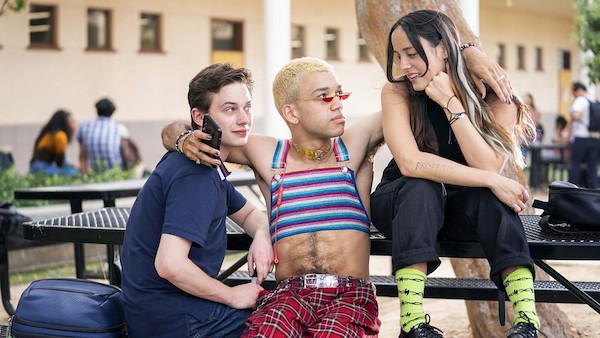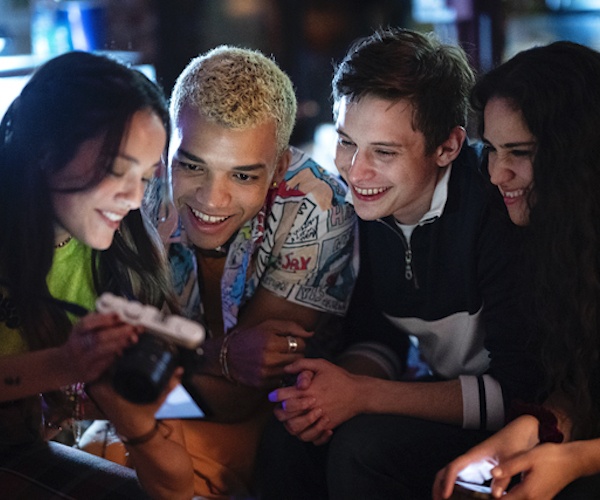Television Review: “Genera+ion” — A Sketchy Look at Gen Z
By Sarah Osman
Considering the show’s uneven writing, there’s no certainty that Genera+ion will last longer than a viral TikTok video.

A scene from HBO Max’s Genera+ion. Photo: HBO Max
For the last few years, I have had the pleasure of teaching Gen Z. A few of my teacher friends and I have laughed over some of the (accurate) stereotypes, such as Gen Z’s love for TikTok and their knee jerk nihilistic outlook on the world (which, in all fairness, is often warranted). However, we have also noticed that Gen Z is far more progressive, socially conscious, and caring than previous generations. For some reason, the greater media is determined to portray them as “edgy,” which means there have been few depictions that have captured Gen Z’s empathetic feelings and inquisitive nature.
Genera+ion, HBO Max’s latest attempt at capturing Gen Z’s teen angst takes a rather different look at the age group. A cross between Euphoria and Sex Education (alas, lacking the latter’s humor and former’s beauty), Genera+ion is the brain child of a member of Gen Z. Nineteen-year-old Zelda Barnz wrote and co-created the show along with her father, Daniel Barnz. Her other father, Ben Barnz, executive produced the show with Girls creator and star Lena Duhman. Dunham’s Millennial comedy was greeted with mixed reactions because many viewers felt that Girls only focused on the lives of spoiled white women living in Brooklyn. Sadly, Genera+ion falls into that same frustrating trap, except this time around the coddled cohort features Gen Z with a sprinkling of diverse characters. What’s more, some of Dunham’s questionable humor and storytelling strategies have been slipped into the trials and tribulations of a younger generation.
The series follows a group of teenagers who I believe are living in Orange County, CA (I think — this is never made explicitly clear). The first episode introduces us to a number of different characters by dramatizing their perspectives on events that occurred on the same day. I found this opening to be quite interesting because it gave us the backstories of each character. We quickly became invested in their stories.
However, the first scene rings absurd. A teenager, who did not know she was pregnant, is giving birth in a handicap stall. Her friend checks out Wiki to find instructions on how to give birth while also checking on the sale at Sephora. Weirder still: the development of this farce is used to open each episode, and each time this specific group of characters seems to get dumber and dumber. One girl blocks the security guard from entering the stall, claiming that he can’t say “handicapped” anymore. Another girl seizes a bunch of cups from a restaurant at the food court and yells “reparations!” These high jinks are meant to be amusing, perhaps satirizing Gen Z’s obsession with being “woke.” But I found the silliness to be rather insulting to teenagers. Why should I care about characters who are so clueless?

A scene from HBO Max’s Genera+ion. Photo: HBO Max
Thankfully not all the characters in Genera+ion are that slow. The most intriguing figure, by far, is Chester (Justice Smith), an out and proud water polo player who wears rainbow crop tops to school. Because this breaks the dress code, Chester is sent to the new counselor, Sam (Nathan Stewart-Jarett), who sees underneath the teen’s outrageous armor. Chester develops a crush on Sam and opens up to him about his loneliness as well as his cynicism about the world around him. Chester shrugs off responsibility to others and himself; according to him, we will all die in 20 years due to global warming. Chester and Sam’s shared bond over going through life as Black gay men is one of the most powerful through lines in the series. Chester’s struggle — to accept himself and the challenging world he lives in — makes for riveting drama. Smith does an excellent job of oscillating between Chester’s outgoing facade and his deep-seated insecurity.
Greta (Haley Sanchez) is the second most provocative character, and probably the most relatable. Greta is infatuated with the free-spirited photographer Riley (Chase Sui Wonders), which means Greta has to come to terms with her own sexuality. She frets about how she appears to Riley, who inspires frantic texts while triggering the girl’s shyness. (Greta often uses her hair as a shield and speaks in rapid, short sentences. ) This grappling with a relationship is downright wholesome; it will remind all of us of the pain of having a crush on someone and not exactly knowing how to handle it. Greta’s home life is a complex arrangement. Her mother has been deported to Guadalajara so Greta is living with her brash aunt, who sweetly supports her attraction. It’s evident that daughter and mother do not have the best relationship, but that Greta misses her. Riley remains a bit of an enigma — she seems to be the one character who is a bit more emotionally mature than her peers.
The other characters are all intertwined. Twins Nathan (Uly Schlesinger) and Naomi (Chloe East) share everything (including lovers) and seem to be the most well off, financially speaking. Their mother, played by the amazing Martha Plimpton, loves to keep a detailed calendar marking her family’s every move up to date — she basks in her apparently perfect Christian family. Her story line becomes one of the most nuanced once she discovers that Nathan is bi. Watching Plimpton attempt to come to terms with that revelation provides some of the finest acting in the series.
Naomi, on the other hand, comes across as spoiled and complacent. Her best friend, Arianna (Nathanya Alexander), is an even more baffling character. Because she has two wealthy gay dads, Arianna assumes she can say whatever she wants, no matter how offensive. She is aware of both her wealth and her Black identity. Why should Arianna text things like “I don’t speak White” when referring to boats? It is clear that she would have been exposed to yachts and country clubs via her wealthy fathers. Like Naomi, Arianna doesn’t have much substance; in truth, she is a writer’s device, set up to spout off hollow Gen Z lingo. The aforementioned girl giving birth, Delilah (Lukita Maxwell), also comes across as a Gen Z caricature. What other reason is there to create a figure who is so stupid?
Genera+ion does supply some powerful moments, such as the fear of being trapped in a classroom during a lockdown or the exhilaration of smoking weed for the first time. Revealingly, these episodes revolve around Greta, Chester, and Riley, no doubt because they are the show’s most emotionally and intellectually mature characters. The rest of the group feels a bit too cartoonish to care much about; every time the focus flipped to Naomi screaming at her brother I was distracted. To its credit, Genera+ion explores the macro and micro problems that teens face: from the effects of climate change and MAGA to how to get a crush’s attention. Perhaps the series needs time to settle. A second season — sans certain characters — would benefit the show. Still, considering the uneven scripting, there’s no certainty Genera+ion will last longer than a viral TikTok video.
Sarah Mina Osman is a writer living in Los Angeles. She has written for Young Hollywood and High Voltage Magazine. She will be featured in the upcoming anthology Fury: Women’s Lived Experiences under the Trump Era.
